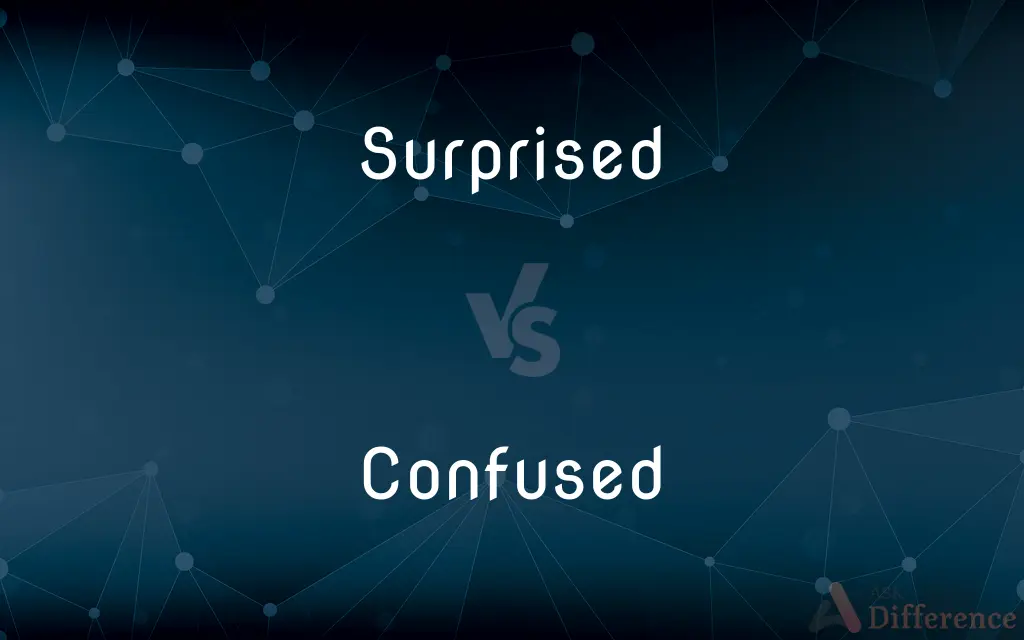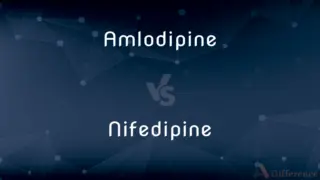Surprised vs. Confused — What's the Difference?
By Fiza Rafique & Urooj Arif — Updated on April 16, 2024
Surprised involves a sudden emotional reaction to an unexpected event, while confused entails a lack of understanding often causing uncertainty.

Difference Between Surprised and Confused
Table of Contents
ADVERTISEMENT
Key Differences
Surprised is an emotional state triggered by something unexpected or unforeseen, eliciting reactions such as shock or astonishment. Whereas, confused is characterized by a state of perplexity or bewilderment, where clarity and understanding are compromised.
People feel surprised when events deviate sharply from their predictions or assumptions, leading to an instantaneous emotional response. On the other hand, confusion arises when individuals face ambiguity or conflicting information that challenges their ability to process and understand.
The expression of surprise is typically brief and intense, reflecting an acute disruption of one's expectations. In contrast, confusion can be a prolonged state, where resolution requires clarification or additional information.
Surprised reactions can be positive, neutral, or negative, depending on the context and nature of the unexpected event. Confused states are generally viewed negatively, as they hinder decision-making and cognitive clarity.
While surprise often leads to quick emotional and sometimes physical reactions, confusion demands cognitive engagement and problem-solving efforts to resolve the uncertainty faced.
ADVERTISEMENT
Comparison Chart
Emotional Trigger
Unexpected events
Ambiguity or contradictory information
Duration
Short, transient
Can be prolonged
Typical Response
Shock, jump, gasp
Frown, scratch head
Impact on Decision
Minimal, unless event is critical
Significant, impedes clear thinking
Associated Feelings
Astonishment, excitement, fear
Frustration, doubt
Compare with Definitions
Surprised
An unexpected occurrence.
The rain was a surprised disruption to the picnic.
Confused
Difficulty in understanding.
The foreign language left him feeling confused.
Surprised
Reaction to novelty or shock.
They were surprised to see a deer in their backyard.
Confused
State of being unable to think clearly.
He was confused by the complex instructions.
Surprised
Feeling caused by something unexpected.
His surprise birthday party left him speechless.
Confused
Feeling perplexed or uncertain.
She looked confused during the lecture.
Surprised
A state of being taken aback.
I was surprised at the news of his retirement.
Confused
Mixture of contradictory feelings.
He was confused about his feelings for her.
Surprised
Sudden emotional response to unexpected events.
She was surprised by the loud noise.
Confused
Lacking clarity or order.
The documents were all confused and disorganized.
Surprised
Feeling or showing surprise
There was a surprised silence
Confused
Being unable to think with clarity or act with understanding and intelligence.
Surprised
To cause to feel wonder, astonishment, or amazement, as at something unanticipated
Thinking I was at home, she was surprised to see me in the office. We were surprised that he could recover so quickly.
Confused
Lacking logical order or sense
A confused set of rules.
Surprised
To encounter or discover suddenly or unexpectedly; take or catch unawares
She surprised him as he was reading her diary.
Confused
Chaotic; jumbled
A confused mass of papers.
Surprised
To attack or capture suddenly and without warning
Surprised the sentries in a predawn raid, wounding several.
Confused
Simple past tense and past participle of confuse
Surprised
To cause (someone) to do or say something unintended or to be in an unintended condition
"There passed a scene ... that surprised me into courage to come forward" (Fanny Burney).
Confused
(of a person) unable to think clearly or understand
Surprised
To elicit or detect through surprise
"She occasionally surprised a look on Jemima's face" (Marcia Willett).
Confused
(of a person or animal) disoriented
Surprised
The act of surprising or the condition of being surprised
Imagine my surprise on seeing you here.
Confused
Chaotic, jumbled or muddled
Surprised
Something, such as an unexpected encounter, event, or gift, that surprises.
Confused
Making no sense; illogical
Surprised
Caused to feel surprise, amazement or wonder, or showing an emotion due to an unexpected event.
Confused
Embarrassed
Surprised
Simple past tense and past participle of surprise
Confused
Same as confounded; as, bewildered and confused.
Surprised
Taken unawares or suddenly and feeling wonder or astonishment;
Surprised by her student's ingenuity
Surprised that he remembered my name
A surprised expression
Confused
Lacking orderly continuity.
Confused
Thrown into disorder; as, His workbench held a confused assortment of spare engine parts..
Confused
Having lost one's bearings physically or mentally.
Confused
Not marked by fine distinctions.
Confused
Causing bafflement and confusion.
Confused
Perplexed by many conflicting situations or statements; filled with bewilderment;
Obviously bemused by his questions
Bewildered and confused
A cloudy and confounded philosopher
Just a mixed-up kid
She felt lost on the first day of school
Confused
Lacking orderly continuity;
A confused set of instructions
A confused dream about the end of the world
Disconnected fragments of a story
Scattered thoughts
Confused
Having lost your bearings; confused as to time or place or personal identity;
I frequently find myself disoriented when I come up out of the subway
The anesthetic left her completely disoriented
Confused
Thrown into a state of disarray or confusion;
Troops fleeing in broken ranks
A confused mass of papers on the desk
The small disordered room
With everything so upset
Confused
Mentally confused; unable to think with clarity or act intelligently;
The flood of questions left her bewildered and confused
Common Curiosities
How does confusion affect decision-making?
Confusion can impair decision-making by reducing clarity and focus.
What are common signs of confusion?
Common signs include frowning, hesitation, and asking for clarification.
How can one clarify confusion?
Seeking additional information or explanation can help resolve confusion.
What is the opposite of being surprised?
The opposite of being surprised might be anticipation or preparedness.
How can teachers reduce confusion in the classroom?
Teachers can reduce confusion by providing clear instructions and engaging in interactive teaching methods.
What causes a person to feel surprised?
Unexpected events or information trigger surprise.
What does it mean to feel confused?
Feeling confused means experiencing difficulty in understanding or making sense of something.
Is surprise always a short-lived emotion?
Generally, surprise is brief, but it can lead to longer emotional responses depending on the situation.
Can surprise be a positive experience?
Yes, surprises can be positive, such as receiving a gift or hearing good news.
Can someone be surprised and confused at the same time?
Yes, complex situations can elicit both surprise and confusion simultaneously.
Do surprises have to be unplanned?
While surprises are typically unplanned, some may be orchestrated by others as in surprise parties.
Does age affect how often one feels surprised?
Younger individuals might experience surprise more frequently due to less life experience.
What is the opposite of being confused?
Clarity or understanding is the opposite of confusion.
What strategies can help manage sudden surprises?
Staying adaptable and open-minded can help manage the impact of surprises.
Can confusion be beneficial?
Sometimes, confusion can lead to deeper inquiry and learning.
Share Your Discovery

Previous Comparison
Olivine vs. Peridot
Next Comparison
Amlodipine vs. NifedipineAuthor Spotlight
Written by
Fiza RafiqueFiza Rafique is a skilled content writer at AskDifference.com, where she meticulously refines and enhances written pieces. Drawing from her vast editorial expertise, Fiza ensures clarity, accuracy, and precision in every article. Passionate about language, she continually seeks to elevate the quality of content for readers worldwide.
Co-written by
Urooj ArifUrooj is a skilled content writer at Ask Difference, known for her exceptional ability to simplify complex topics into engaging and informative content. With a passion for research and a flair for clear, concise writing, she consistently delivers articles that resonate with our diverse audience.
















































